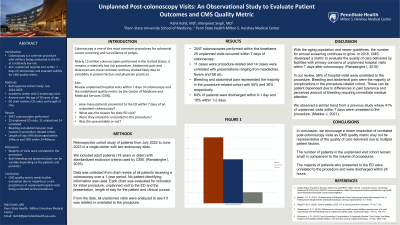Tuesday Poster Session
Category: Colorectal Cancer Prevention
P3818 - Unplanned Post-Colonoscopy Visits: An Observational Study to Evaluate Patient Outcomes and CMS Quality Metric
Tuesday, October 29, 2024
10:30 AM - 4:00 PM ET
Location: Exhibit Hall E

Has Audio

Rahil Kohli, MD
Penn State Health Milton S. Hershey Medical Center
Hummelstown, PA
Presenting Author(s)
Rahil Kohli, MD1, Manpreet Singh, MD2
1Penn State Health Milton S. Hershey Medical Center, Hummelstown, PA; 2Penn State Health Milton S. Hershey Medical Center, Hershey, PA
Introduction: The United States Preventive Services Task Force (USPSTF) recommends screening for colon cancer in all adults aged 45 to 70 years with either stool-based testing or direct visualization. Colonoscopy is one of the most common procedures for colorectal cancer screening and surveillance of polyps.
With nearly 15 million colonoscopies performed in the United States, it remains a relatively low risk procedure. (Siegel R, 2020) Serious complications like bowel perforation and mortality have been stable at 0.05% and 0.0029% respectively. Bleeding has decreased from 0.064% to 0.001% (Reumkens, 2016). Abdominal pain and distension are more common and less studied likely due to variability in patient factors and physician practices.
This study aims to review unplanned hospital visits within 7 days of colonoscopy and the established quality metric by the Center of Medicare and Medicaid Services (CMS).
Methods: We conducted a retrospective cohort study of patients from July 2022 to June 2023 in a single center with two endoscopy sites. We included adult patients (18 years or older) with standardized exclusion criteria used by CMS. (Ranasinghe I, 2016)
Results: There were 3047 colonoscopies performed within this timeframe. 25 unplanned visits occurred within 7 days of colonoscopy. 11 cases were procedure-related and 14 cases were unrelated with presentations ranging from headaches, fevers and fall etc. Bleeding and abdominal pain represented the majority in our procedure-related cohort with 55% and 36% respectively.
64% of patients were discharged within 0-1 day and 18% within 1-2 days.
Discussion: With the aging population and newer guidelines, the number for annual screening continue to grow. In 2016, CMS developed a metric to evaluate the quality of care delivered by facilities with primary concerns of unplanned hospital visits within 7 days after colonoscopy. (Ranasinghe I, 2016)
In our review, 56% of hospital visits were unrelated with bleeding and abdominal pain being the majority in the procedure-related cohort. These can be patient dependent due to varying levels of pain tolerance and perceived amount of bleeding requiring immediate medical attention.
We observed a similar trend from a previous study where 41% of unplanned visits within 7 days were unrelated to the procedure. (Makker J, 2021) In conclusion, we encourage a closer inspection of unrelated post-colonoscopy visits, as CMS quality metric may be not be representative of the quality of care delivered due to multiple patient factors.
Disclosures:
Rahil Kohli, MD1, Manpreet Singh, MD2. P3818 - Unplanned Post-Colonoscopy Visits: An Observational Study to Evaluate Patient Outcomes and CMS Quality Metric, ACG 2024 Annual Scientific Meeting Abstracts. Philadelphia, PA: American College of Gastroenterology.
1Penn State Health Milton S. Hershey Medical Center, Hummelstown, PA; 2Penn State Health Milton S. Hershey Medical Center, Hershey, PA
Introduction: The United States Preventive Services Task Force (USPSTF) recommends screening for colon cancer in all adults aged 45 to 70 years with either stool-based testing or direct visualization. Colonoscopy is one of the most common procedures for colorectal cancer screening and surveillance of polyps.
With nearly 15 million colonoscopies performed in the United States, it remains a relatively low risk procedure. (Siegel R, 2020) Serious complications like bowel perforation and mortality have been stable at 0.05% and 0.0029% respectively. Bleeding has decreased from 0.064% to 0.001% (Reumkens, 2016). Abdominal pain and distension are more common and less studied likely due to variability in patient factors and physician practices.
This study aims to review unplanned hospital visits within 7 days of colonoscopy and the established quality metric by the Center of Medicare and Medicaid Services (CMS).
Methods: We conducted a retrospective cohort study of patients from July 2022 to June 2023 in a single center with two endoscopy sites. We included adult patients (18 years or older) with standardized exclusion criteria used by CMS. (Ranasinghe I, 2016)
Results: There were 3047 colonoscopies performed within this timeframe. 25 unplanned visits occurred within 7 days of colonoscopy. 11 cases were procedure-related and 14 cases were unrelated with presentations ranging from headaches, fevers and fall etc. Bleeding and abdominal pain represented the majority in our procedure-related cohort with 55% and 36% respectively.
64% of patients were discharged within 0-1 day and 18% within 1-2 days.
Discussion: With the aging population and newer guidelines, the number for annual screening continue to grow. In 2016, CMS developed a metric to evaluate the quality of care delivered by facilities with primary concerns of unplanned hospital visits within 7 days after colonoscopy. (Ranasinghe I, 2016)
In our review, 56% of hospital visits were unrelated with bleeding and abdominal pain being the majority in the procedure-related cohort. These can be patient dependent due to varying levels of pain tolerance and perceived amount of bleeding requiring immediate medical attention.
We observed a similar trend from a previous study where 41% of unplanned visits within 7 days were unrelated to the procedure. (Makker J, 2021) In conclusion, we encourage a closer inspection of unrelated post-colonoscopy visits, as CMS quality metric may be not be representative of the quality of care delivered due to multiple patient factors.
Disclosures:
Rahil Kohli indicated no relevant financial relationships.
Manpreet Singh indicated no relevant financial relationships.
Rahil Kohli, MD1, Manpreet Singh, MD2. P3818 - Unplanned Post-Colonoscopy Visits: An Observational Study to Evaluate Patient Outcomes and CMS Quality Metric, ACG 2024 Annual Scientific Meeting Abstracts. Philadelphia, PA: American College of Gastroenterology.
